Blood pressure and sleep deprivation are connected.
Sleep plays an important role in regulating blood pressure, and a lack of sleep can lead to high blood pressure levels.
In fact, as many as 40% of individuals with hypertension report that they have difficulty sleeping.
Sleeping less than six hours per night has been linked to a higher risk of death from cardiovascular disease and stroke.
There are many things that can cause sleep deprivation, and the most common ones include
- stress (especially from work), uncomfortable sleeping conditions like a too hot or cold room, medications such as caffeine or nicotine to stay awake,
- alcohol consumption which disrupts sleep cycles, and
- shift work which causes insomnia due to circadian rhythm disruption.
In this blog post, we'll explore the link between sleep and high blood pressure.
We'll discuss how much sleep people need (according to the National Sleep Foundation) and what happens when they don't get enough of it.
We'll also cover some tips for getting more quality shut-eye so you can avoid heart disease, diabetes, obesity, and other serious conditions.
What is blood pressure and what are the symptoms of high blood pressure

Blood pressure is the measure of force that blood exerts on your artery walls while circulating through your body.
The higher your blood pressure, the more likely it is for you to develop heart disease and stroke.
The level of your Blood pressure is measured in millimetres of mercury (mmHg).
Two of the causes of high blood pressure that will be highlighted in this article is stress and sleep deprivation, which can increase your risk for heart disease, stroke or kidney failure.
The stress hormone cortisol is released in your body when a stressful event occurs.
It can lead to high blood pressure by making the arteries constrict and restricting how much blood flows through them, which increases the force on artery walls.
This puts extra strain on the heart that may cause it to enlarge or weaken over time.
Symptoms of high blood pressure include:
- headaches
- dizziness/fainting spells
- nausea and vomiting.
- blurred vision
- shortness of breath
- chest pain when lying down
How can you tell if your blood pressure is too high
To know if your blood pressure is too high, you need to know the numbers.
The American Heart Association (AHA) blood pressure category are:
Normal: Less than 120/80 mm Hg.
Elevated: Systolic between 120 and 129 mm Hg and diastolic less than 80 mm Hg.
Stage 1: Systolic between 130 and 139 mm Hg or diastolic between 80 and 89 mm Hg.
Stage 2: Systolic at least 140 mm Hg or diastolic at least 90 mm Hg.
Hypertensive crisis: Systolic over 180 mm Hg and/or diastolic over 120 mm Hg, with patients requiring medication changes.
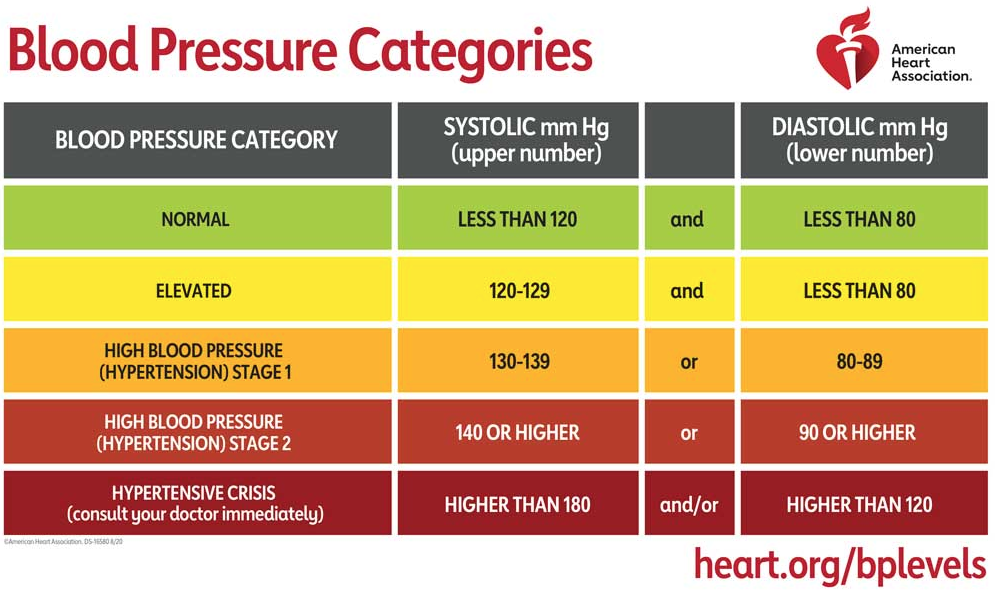
The AHA recommends that you have your blood pressure checked more often if your levels are higher or lower and if the reading is consistently
The numbers stand for the systolic and diastolic pressure, respectively.
Systolic refers to the maximum force of blood that is exerted on your artery walls when your heart contracts due to increased demand in circulation, while diastolic refers to the minimum (and most common ) force of blood that is exerted on your artery walls when the heart relaxes in between beats.
The higher these numbers are, the more likely you will be at risk for heart disease and stroke.
It may also cause headaches or chest pain. You should consult a doctor if you experience any of these symptoms while feeling stressed with high blood pressure.
What are some tips for lowering your blood pressure naturally

To lower your blood pressure naturally, consider these helpful tips:
- Exercise every day, even if it's just for a few minutes. When you exercise, your body releases endorphins that can help lower blood pressure and stress levels.
- Eat more fruits and vegetables to reduce the effects of high sodium intake on your blood pressure.
- Your blood pressure will be lower if you avoid consuming Fast food, processed meat and eggs, sugar or sugary products, sodas.
Fast food is high in sodium which can increase your blood pressure. Processed meats are often loaded with preservatives and processed sugars. They have been linked to an increased risk of heart disease, certain cancers, obesity and diabetes.
- Cut down on alcohol consumption
- Do not smoke cigarettes or use any nicotine products before bedtime. Smoke and tobacco contain nicotine which can raise your blood pressure, make you restless, disturb sleep patterns, and irritate the lining of the airways in people with asthma and other breathing conditions.
- Reduce stress by practising relaxation techniques such as deep breathing and meditation.
- This goes without saying, get regular sleep as much as possible.
Sleep deprivation's effect on our health
According to the national sleep foundation, sleep deprivation has a number of detrimental effects on the body.
If you sleep less than six hours per night, it can lead to weight gain and diabetes.
Sleep is also important for regulating moods and concentration levels so not getting enough sleep may make you irritable or depressed, which in turn could affect your job performance too.
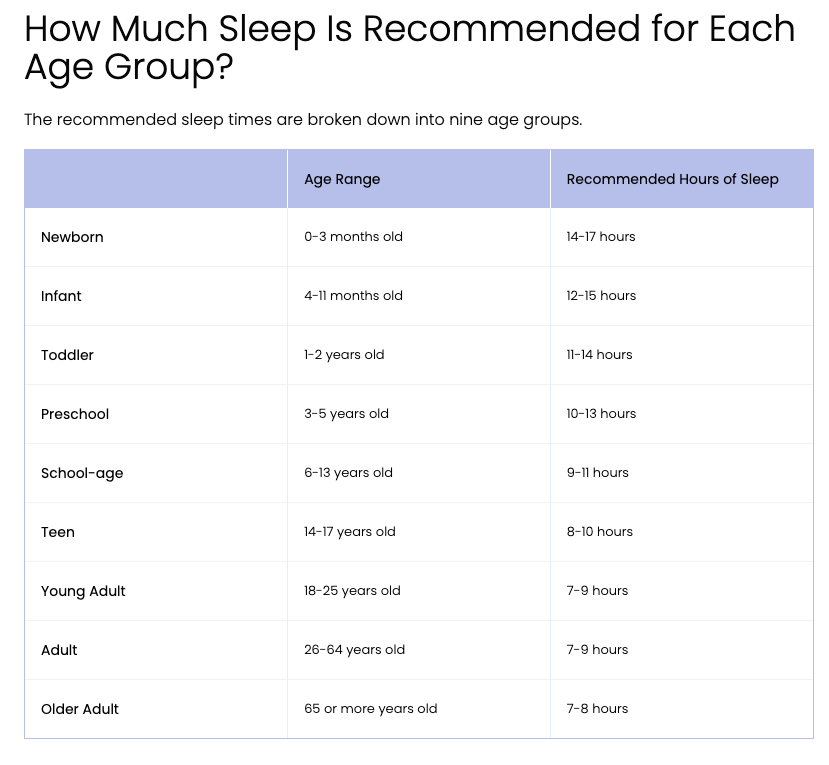
Chart from sleepfoundation.org
Sleep deprivation is defined as the condition of not getting enough sleep.
It is a form of insomnia and can be caused by poor sleeping habits, sickness or working odd hours.
A lack of sleep interferes with the body’s production of brain-derived neurotrophic factor (BDNF), also known as the Nerve Growth Factor (NGF).
Neurotrophic factor BDNF helps to create new brain cells promotes their growth and protects them from damage.
BDNF decreases the production of stress hormones that increase blood pressure (cortisol) by constricting arteries.
A decrease in BDNF also results in less elasticity for our arteries which could lead to a higher risk for high blood pressure or even heart disease.
Sleep deprivation is the most common form of sleep disorder.
Symptoms of sleep deprivation are similar to that of major depressive disorder.
The average person needs between seven and nine hours a night, but up to 12 hours isn't unheard-of for some people.
The need varies based on life stages.
List of foods that help lower blood pressure

Food is one of the approaches that can be taken to help lower blood pressure.
It is important that food choices are made wisely because some foods have negative effects on blood pressure due to high salt and sugar content.
- Vegetables - vegetables provide low-sodium options for healthy eating and should be included in each meal.
They also contain magnesium which has been shown to help reduce blood pressure.
- Nuts - nuts contain magnesium and omega-three fatty acids which are both beneficial to reducing blood pressure.
Additionally, they provide the fibre that promotes a healthy gut environment for better absorption of nutrients and subsequent reduction in body inflammation (which can lead to higher blood pressure).
- Poultry - lean poultry such as chicken provides a good source of protein and B vitamins which both contribute to healthy blood pressure.
- Fruits - as an excellent source of potassium, fruits can help reduce high blood pressure by regulating the amount of sodium in your diet.
- Foods that are high in omega-three fatty acids. Fish, walnuts and flax seeds have some of the highest levels of these essential nutrients to help lower your blood pressure naturally by improving lipid profiles which is very important for reducing cholesterol levels as well.
- whole grains like oatmeal or brown rice can also help lower blood pressure
- Water - Not food per see however, water is a vital source of hydration for the body. Drinking enough water can help flush out toxins and improve kidney function to lower blood pressure.
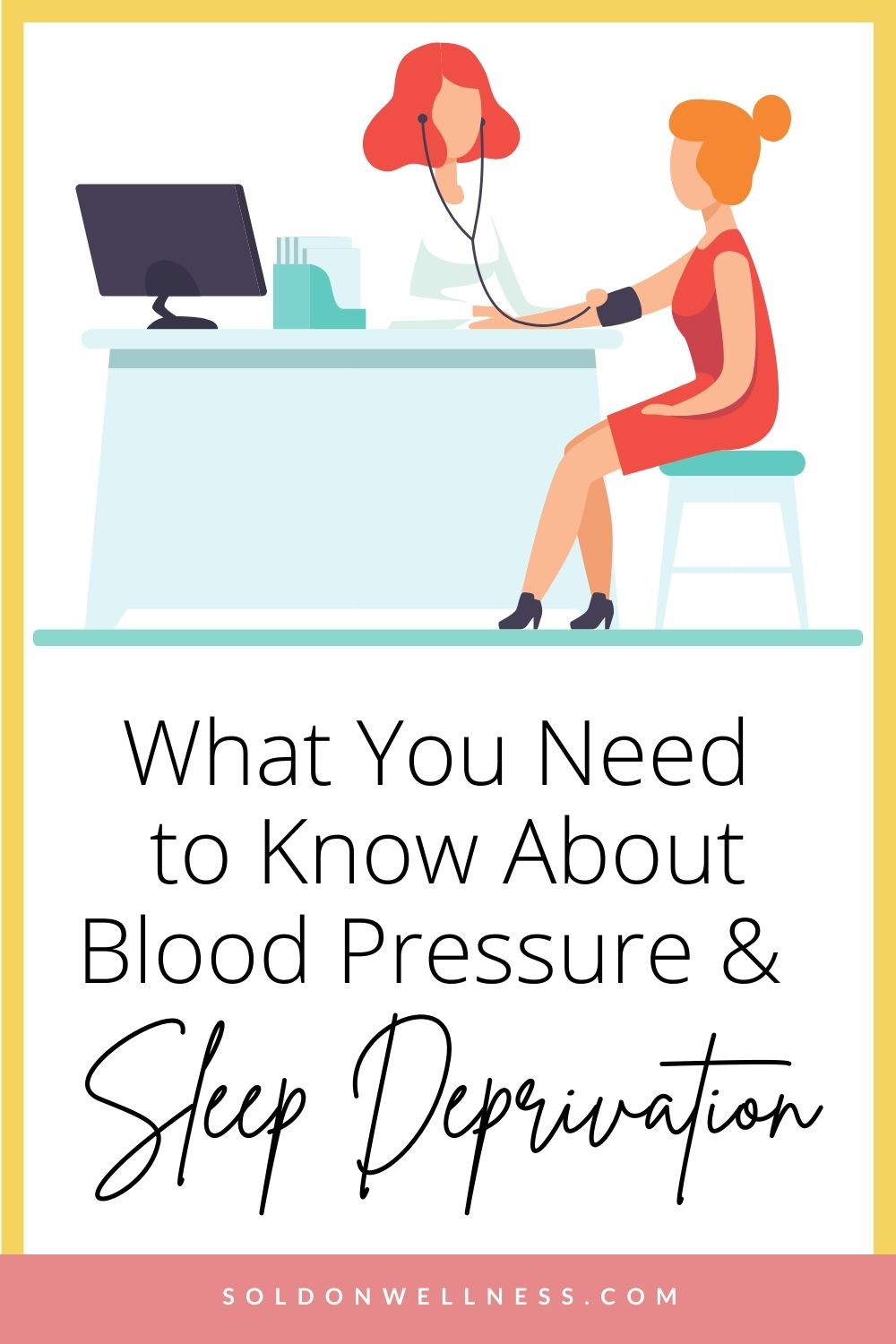
Tips for getting more restful sleep
Getting more restful sleep can help lower your blood pressure.
In other to ensure healthy sleep patterns, make sure you’re getting a sufficient amount of sleep on most nights.
Sleep not only recharges your mental and physical well-being, but it also helps you to maintain a healthy weight.
Research has found that people who suffer from short-term sleep deprivation (fewer than four hours) have three times the risk of obesity as those who regularly get enough sleep on average.

To enjoy a restful sleep, it’s important to follow these tips:
- Maintain a regular sleeping schedule by going to bed and waking up around the same time every day.
You should try as much as possible to maintain your sleep schedule even on weekends, holidays and vacations.
- Avoid caffeine after noon, exercise regularly during the day (for example start earlier)
- Take a warm bath before bed to promote relaxation
- Get help with stressors that are causing you emotional turmoil or anxiety by talking to someone who can be supportive of your needs.
- Avoid using screens for an hour before bedtime; include reading a book or listening to soothing music instead of watching TV or playing video games.
- Keep your bedroom dark, quiet, cool and comfortable. The room temperature should be between 60°F (16°C) and 75 °F (24 °C).
- Reduce your alcohol consumption to prevent sleep disruptions.
- Consider a CPAP device to promote uninterrupted sleep. These devices can help regulate breathing and provide air pressure in order for you to breathe easier while sleeping.
- If you are considering taking medication, consult with your doctor before doing so as these medications may also affect sleep quality or have other side effects.
- A good Mattress can contribute to good sleep if it provides the right amount of support. Things you want to look out for in a good mattress are comfort, durability and firmness.
If you need help with a sleep disorder or other sleep problems that are preventing adequate rest, it will be important to talk with a sleep specialist.
Sleep specialists can help diagnose and treat many different types of sleep disorders including obstructive sleep apnea, narcolepsy, insomnia, restless legs syndrome and more.
The effects of stress on high blood pressure, sleep, and heart health
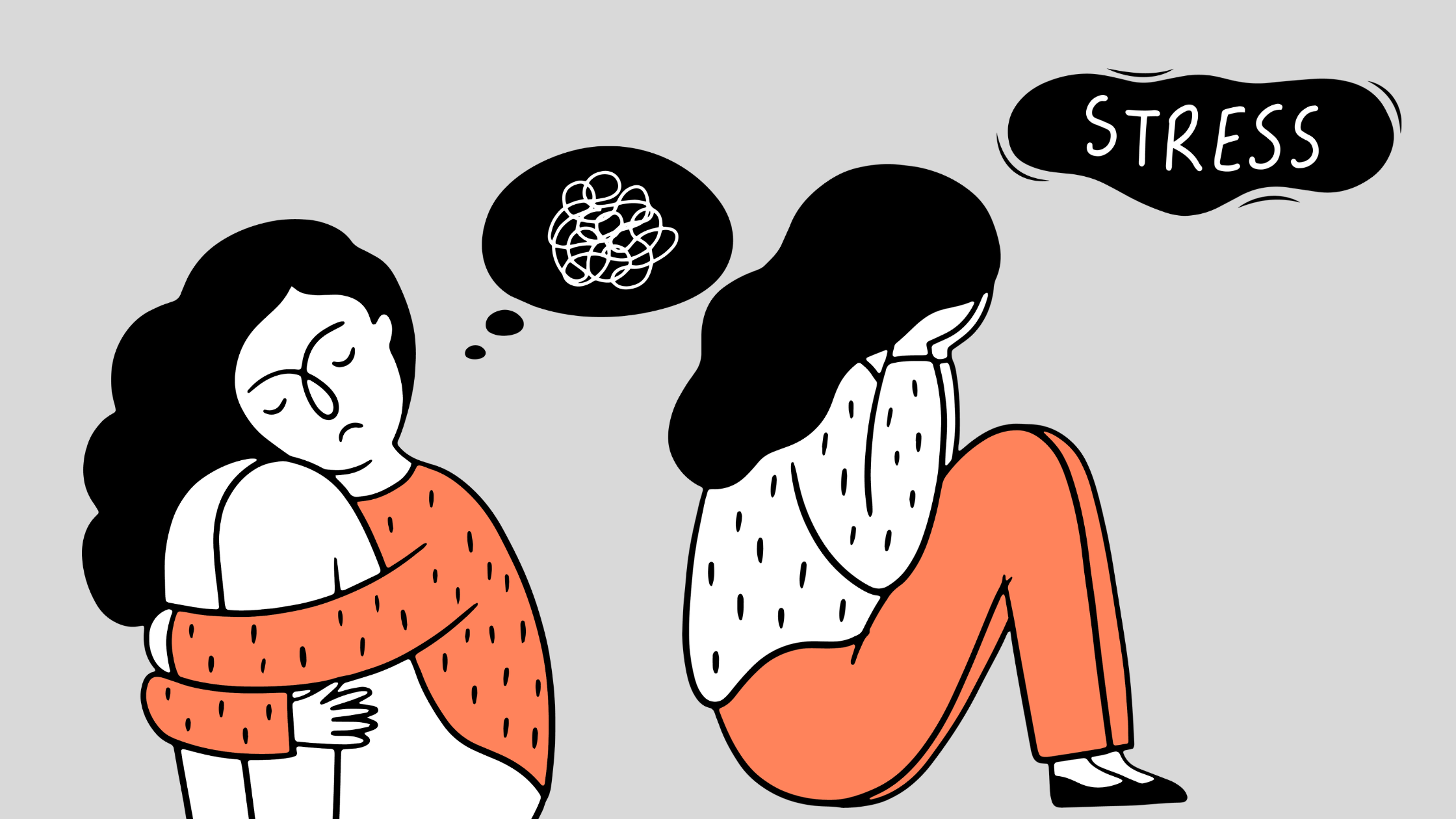
The effects of stress on high blood pressure, sleep deprivation, and heart health are a hot topic.
Some researchers have come to the conclusion that stress is a risk factor for hypertension and sleep deprivation.
Oftentimes, high blood pressure can be caused by other factors like diet and lifestyle choices but it's also possible that chronic stress may play a role in certain cases.
The effect of stress on high blood pressure is complex.
Chronic stress is a risk factor for both lower and higher blood pressure, depending on the individual's response to it.
For example, people with high resting heart rates or who have a tendency towards anxiety may be more likely to experience an increase in their blood pressure at times of stress as opposed to those without these traits.
People who experience lower blood pressure in response to stress are at higher risk for hypertension.
The effect of stress on sleep
The relationship between sleep and stress is bidirectional, meaning that a person's level of stress can affect their sleep quality as well as vice versa.
For example, chronic worry or anxiety about one's job can lead to sleep disturbances like trouble falling asleep or staying asleep throughout the night.
However, lack of adequate sleep can also lead to stress and anxiety.
The relationship between stress and heart disease
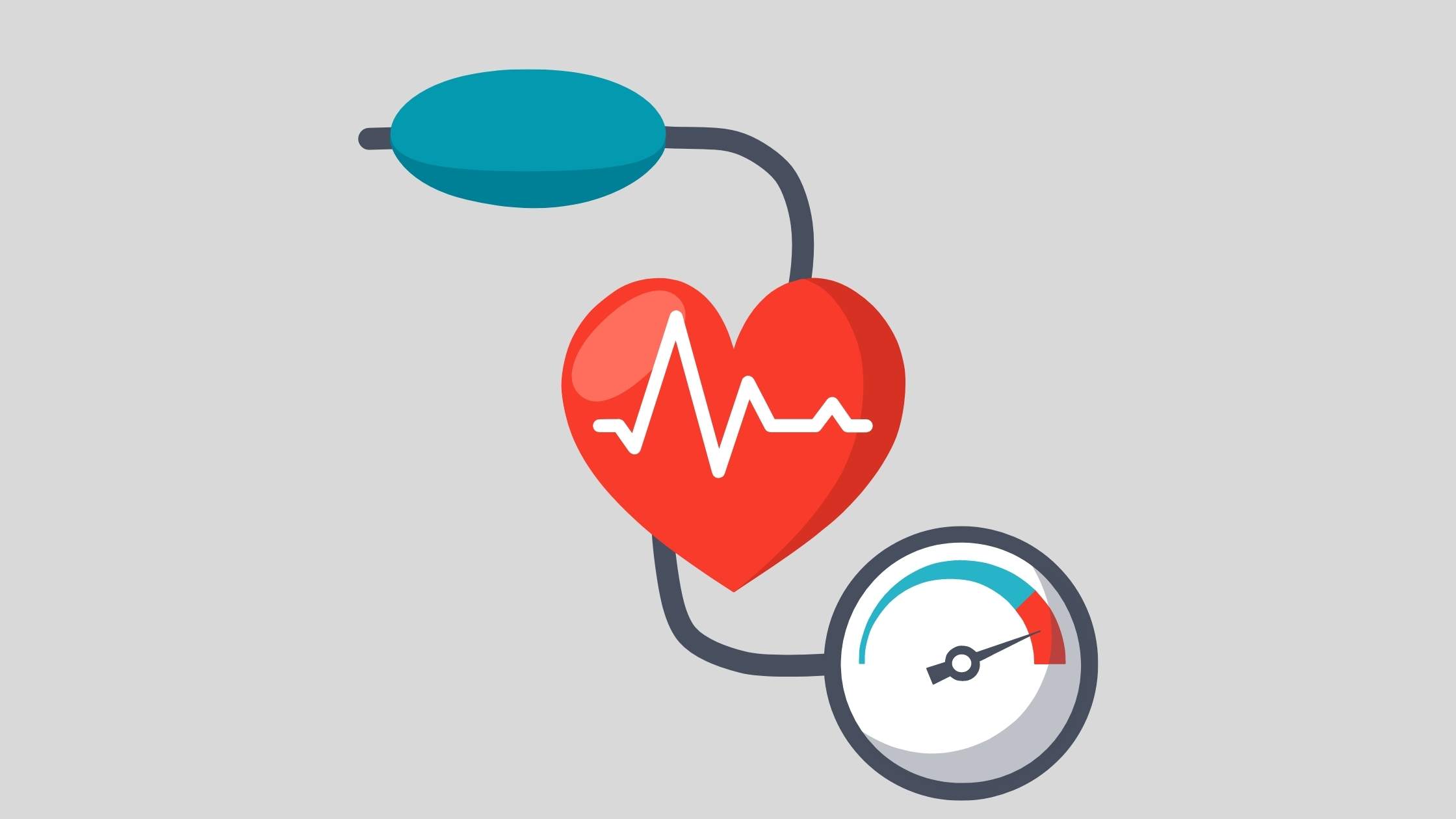
There is some evidence that stress can increase the risk for cardiovascular disease.
Stress hormones like cortisol, which are released in response to stress and activate other bodily systems such as the immune system, have been shown to be damaging both to healthy tissue and diseased cells.
Some theorize that chronic exposure to these hormones may make blood vessels constrict and blood pressure rise.
Importance of maintaining healthy levels of both stress and exercise

Healthy levels of both stress and exercise are very important when it comes to maintaining a healthy lifestyle.
Studies have shown that stress is one of the most prevalent factors when it comes to heart disease.
It's been reported that people who experience chronic stress are at higher risk for coronary artery calcification, which can lead to clogged arteries and eventually stroke or heart failure.
However, studies also show that those who exercise at least three times a week experienced less stress and had a better quality of life.
So, if you're experiencing chronic stress in your daily life (or just want to live as long and healthy as possible) it's important that find time for both exercise AND relaxation because they each have different benefits.
For Healthy levels of stress and exercise consider the following:
Stress:
Some stress is good for us, but too much stress can be harmful.
The American Psychological Association recommends a healthy amount of stress as the range between 0 and 60 on the Perceived Stress Scale (PSS).
Exercise:
Between 30 minutes to an hour per day, five days a week is optimal.
You should try to be mindful of the intensity of your workout and the length of time you're working out.
Relaxation:
It's important to take a break from stressors in order to find relief, but it's also crucial that we maintain an optimal level of relaxation for our mental and physical health.
The Mayo Clinic suggests taking five minutes per day to do something that helps you relax, such as taking a bath or listening to music.

Again we circle back to Sleep!
Lack of sleep will cause problems with stress and exercise because it compromises the immune system and causes poor performance in these areas.
It's important to get enough sleep each night for your health.
How to keep up with changes as they happen in your life
The only constant thing in life is change and when change happens in our lives, it can be difficult to keep up.
One way you may find some relief is by creating an action plan with measurable goals so that you are prepared.

- Create a list of all the changes in your life and break them down into categories like work, family, finances and set measurable goals that are realistic. When you break the changes down into categories, it will make them easier to focus on and identify what you want to work on.
- Make a list of all the steps that need to be taken in order for each goal or task to be successful.
- Create an action plan with measurable goals by brainstorming ideas and writing them down, then organize these tasks into chunks so that you don't get overwhelmed.
- Find ways to reward yourself when you accomplish each step in your plan for an increased sense of motivation and accountability.
- Keep a journal with all the changes you need to make so that they are there as reminders if you forget about them or get discouraged along the way.
To manage blood pressure and sleep deprivation starts with making time for a lifestyle change.
Achieving your ideal weight and sleeping seven to eight hours nightly are two of the best ways you can manage stress in your life.
Resources you can read more on...
There have been cases of people just like you who have been able to conquer their sleep deprivation and blood pressure problems.
It is also a good idea to have your blood pressure checked by a doctor at least once every year.
Even if you feel fine, it is a good idea to have a blood pressure monitor at home so you can monitor it yourself.
There are many resources available for people dealing with sleep issues like sleep apnea, insomnia, or other medical conditions that can lead to poor sleep quality.
This includes both online and in-person support groups as well as doctors specializing in the field of sleep.
I have created a resource section listing helpful books about sleeping habits and other resources related to this topic.
Center for Sleep Medicine at Johns Hopkins Hospital: The centre provides inpatient and outpatient sleep studies, diagnosis of sleep disorders as well as treatment options.
Click below to read more on blood Pressure:
To wrap up:

Identify any sources of excessive worrying in your life that's causing sleepless nights and impacting your blood pressure.
Try to set aside time for sleep each night, and schedule it like any other appointment or obligation.
Downtime before bed is not only important for your physical health but also for your mental well-being.
If you're still experiencing high blood pressure despite getting adequate amounts of sleep each night, there may be a need to talk with alike finances or family problems, and see if you can find a solution for those issues that will relieve the worry.
I hope this article has helped you to better understand the relationship between blood pressure and sleep deprivation, how they are related, what causes them to increase together, and what you can do if this is happening for you.
